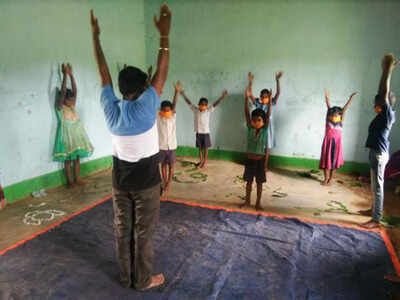
BHUBANESWAR: With schools closed and reliable internet being out of reach for large segments of the population, it is feared that many children may have been cut off from education or fallen behind. But Sikshasandhan, an NGO, has made catching up easier.
The volunteers have ensured that the education of the tribal children in the remote areas of Mayurbhanj and Rayagada districts continued even though they do not have access to necessary hardware and internet connection for online schooling.
Their main concern was that the school-going habit of the children belonging to Lodha and Dongria Kondha tribal communities (particularly vulnerable tribal groups) and Kui Kondha and Ho tribes was not disrupted. The children belong to the 3-14 age group.
In the past, the volunteers had faced difficulties in getting the children back to school after their summer vacation ended. Many either went fishing, did farming or helped parents with their work. The education process started in April-May across 164 villages in Mayurbhanj and 75 villages in Rayagada districts. The project co-ordinators and volunteers from Sikshasandhan actively involved the parents in their children’s education process.
Anil Pradhan, member secretary of Sikshasandhan, said nearly 9,500 children, of which 90% to 95% were tribals, have been benefiting from the programme.
“Our volunteers and parents drop the children to the schools or community halls for classes. We involve the children in group discussions on familiar topics like trees, streams and forests so that they open up,” Swagatika Bhuyan, one of the project co-ordinators, said. Bhuyan has implemented the programme across 12 villages in Mayurbhanj’s Morada and Suliapada blocks. She has 12 volunteers with nine belonging to the Lodha community.
All the NGO volunteers have been drawn from among the tribals to facilitate the process.
The classes were conducted on the school verandah for two to three hours every morning. Children were taught alphabets and numericals. They enjoyed making letters and different shapes with flowers, leaves and pebbles. They were fascinated by pictorial storytelling, indoor and outdoor games, exercises and Origami.
“I love the rabbit and tortoise story. I enjoy playing with my friends, specially when running around in the form of a train,” said Surendra Singh, an 11-year-old Ho tribal from Mayurbhanj’s Tripadamanjaripur village in Kalamgadi panchayat.
The children are also taught to maintain basic hygiene and cleanliness like using masks, sanitizers, soap to wash hands, cutting nails and oiling hair and maintain social distancing.
Ajay Mallick, another project coordinator, said the tribal children were taught in their language and then translated in Odia by the volunteers so that they could relate. “In the process they learn Odia that will be helpful in their education,” he added. Mallick works in Mayurbhanj’s Kaptipada and Jashipur blocks with 54 volunteers.
“The education process does not end with classes. There is a weekly assessment that is shared with the parents. Children also have to mark their attendance every morning,” Ananta Samanta, the project co-ordinator of Rayagada’s Muniguda block, said.
“A special colour coding method has been devised to assess the children. They are given homework,” Rahil Soy, a volunteer in Mayurbhanj’s Kaptipada block, said. He is a Ho tribal.
The parents said they have seen their children improve. “Earlier kids used to roam around, but now they study and remain engaged in other fruitful activities,” Soma Singh, a 33-year-old father of two, said.
The volunteers have ensured that the education of the tribal children in the remote areas of Mayurbhanj and Rayagada districts continued even though they do not have access to necessary hardware and internet connection for online schooling.
Their main concern was that the school-going habit of the children belonging to Lodha and Dongria Kondha tribal communities (particularly vulnerable tribal groups) and Kui Kondha and Ho tribes was not disrupted. The children belong to the 3-14 age group.
In the past, the volunteers had faced difficulties in getting the children back to school after their summer vacation ended. Many either went fishing, did farming or helped parents with their work. The education process started in April-May across 164 villages in Mayurbhanj and 75 villages in Rayagada districts. The project co-ordinators and volunteers from Sikshasandhan actively involved the parents in their children’s education process.
Anil Pradhan, member secretary of Sikshasandhan, said nearly 9,500 children, of which 90% to 95% were tribals, have been benefiting from the programme.
“Our volunteers and parents drop the children to the schools or community halls for classes. We involve the children in group discussions on familiar topics like trees, streams and forests so that they open up,” Swagatika Bhuyan, one of the project co-ordinators, said. Bhuyan has implemented the programme across 12 villages in Mayurbhanj’s Morada and Suliapada blocks. She has 12 volunteers with nine belonging to the Lodha community.
All the NGO volunteers have been drawn from among the tribals to facilitate the process.
The classes were conducted on the school verandah for two to three hours every morning. Children were taught alphabets and numericals. They enjoyed making letters and different shapes with flowers, leaves and pebbles. They were fascinated by pictorial storytelling, indoor and outdoor games, exercises and Origami.
“I love the rabbit and tortoise story. I enjoy playing with my friends, specially when running around in the form of a train,” said Surendra Singh, an 11-year-old Ho tribal from Mayurbhanj’s Tripadamanjaripur village in Kalamgadi panchayat.
The children are also taught to maintain basic hygiene and cleanliness like using masks, sanitizers, soap to wash hands, cutting nails and oiling hair and maintain social distancing.
Ajay Mallick, another project coordinator, said the tribal children were taught in their language and then translated in Odia by the volunteers so that they could relate. “In the process they learn Odia that will be helpful in their education,” he added. Mallick works in Mayurbhanj’s Kaptipada and Jashipur blocks with 54 volunteers.
“The education process does not end with classes. There is a weekly assessment that is shared with the parents. Children also have to mark their attendance every morning,” Ananta Samanta, the project co-ordinator of Rayagada’s Muniguda block, said.
“A special colour coding method has been devised to assess the children. They are given homework,” Rahil Soy, a volunteer in Mayurbhanj’s Kaptipada block, said. He is a Ho tribal.
The parents said they have seen their children improve. “Earlier kids used to roam around, but now they study and remain engaged in other fruitful activities,” Soma Singh, a 33-year-old father of two, said.

Coronavirus outbreak
Trending Topics
LATEST VIDEOS
City
 SSR death probe: Drugs were sent through courier from Sushant's house to Rhea's during lockdown
SSR death probe: Drugs were sent through courier from Sushant's house to Rhea's during lockdown  Sushant Singh Rajput is ‘beta’ of Bihar: Devendra Fadnavis
Sushant Singh Rajput is ‘beta’ of Bihar: Devendra Fadnavis  BSF and NCB bust Pak based psychotropic medicines racket, tablets seized
BSF and NCB bust Pak based psychotropic medicines racket, tablets seized  Sandalwood drug scandal: Enforcement Directorate registers money laundering case
Sandalwood drug scandal: Enforcement Directorate registers money laundering case
More from TOI
Navbharat Times
Featured Today in Travel
Quick Links
Kerala Coronavirus Helpline NumberHaryana Coronavirus Helpline NumberUP Coronavirus Helpline NumberBareilly NewsBhopal NewsCoronavirus in DelhiCoronavirus in HyderabadCoronavirus in IndiaCoronavirus symptomsCoronavirusRajasthan Coronavirus Helpline NumberAditya ThackerayShiv SenaFire in MumbaiAP Coronavirus Helpline NumberArvind KejriwalJammu Kashmir Coronavirus Helpline NumberSrinagar encounter
Get the app



